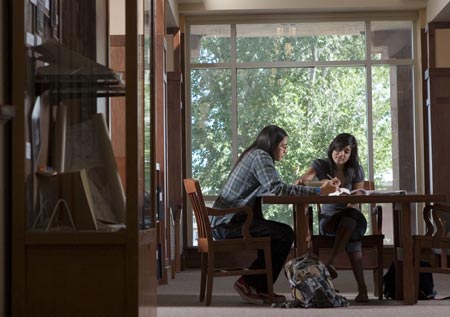A national wakeup call and a culture shift in higher education form the backdrop for a new Northern Arizona University initiative that seeks to boost the effectiveness of first-year courses.
Professor Michelle Miller, incoming chair of psychology and a prominent voice in course redesign, is playing a central role in NAU’s First-Year Learning Initiative, which intends to increase student engagement and retention by revamping courses across a broad range of disciplines.
“This is about something we all want to accomplish,” Miller said, “which is more students coming to college, more students succeeding in college, and more students gaining the skills that they’re going to need to succeed in their lives and careers.”
If that goal seems ambitious, then consider this: Working on an initiative that began to take shape only in March, Miller—who was named a 2011 Distinguished Teaching Fellow at NAU—and initiative co-creator Blase Scarnati are joined by a group of highly motivated peers who hope to revise 28 courses in time for the fall semester.
“It’s intense,” Miller said. “I’ve never seen anything like it.”
It seems that she and the rest of the initiative team are leading by example.
Effort, it turns out, is the key to student success in those crucial first-year courses. At least, that’s a conclusion reached by the authors of Academically Adrift, a recent publication that “really rocked me back on my heels,” Miller said. The book, written by Richard Arum and Josipa Roksa, argued that large numbers of students—nearly half, in some categories—showed marginal gains during their first years in college. Implicated were courses that required little reading, sparse writing and generally little effort.
Retention may be one factor explaining why such courses would be in the curriculum, Miller explained. As tuition revenue rises in importance, there is increasing pressure to retain students—pressure that can, for some faculty, influence grading.
But students still leave, and Miller said it’s not just because they can’t do the work.
“One of the biggest predictors of who stays at NAU is grades,” Miller said, explaining that it’s natural for some struggling students to try another college if their first choice isn’t working out for them. “We need to elicit more effort that leads to learning that leads to better grades.”
The apparent contradiction is explained by what Miller calls “the paradox of rigor,” a principle that has emerged from her own experience. Simply put, “if you make things easy,” she said, “grades will go down. It doesn’t have integrity and it doesn’t work.”
The idea of getting back to basics represents a changing culture in higher education, Miller said. “It’s becoming OK for us to step up and say there’s no substitute for student effort, and we can set up the environment to get that effort from them.”
To do so, Miller and Scarnati, an associate professor of historical musicology and an expert in first-year courses, have been working with a contingent of faculty.
Their focus quickly narrowed to three areas: socializing, design and alignment.
- Socializing involves identifying the top study skills that students need to succeed in a discipline.
- Design gets into the “nitty-gritty” of how a course is set up. Use lectures strategically and judiciously. Make sure students know why the course is important. And tie courses back into what Miller called “the rich university environment.”
- Alignment addresses two questions. First, is there a consistent experience across multiple sections of a particular course? Second, does the course actually reinforce the abilities and skills students need to do well on the assignments?
The initiative’s call to action came from Karen Pugliesi, vice provost for Academic Affairs, whom Miller credits for her support and vision. According to Pugliesi, the initiative builds upon NAU’s extensive work to strengthen the first-year experience, opening the opportunity to “take full advantage of the potential impact those courses can have in helping us to signal to students early on what it takes to be successful as a student.”




